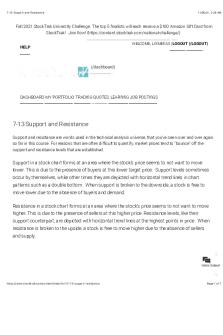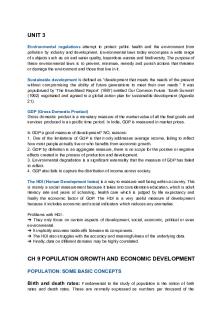Unit 3 - Power and Resistance PDF

| Title | Unit 3 - Power and Resistance |
|---|---|
| Course | Introduction to Sociology |
| Institution | University of California Santa Barbara |
| Pages | 3 |
| File Size | 61.4 KB |
| File Type | |
| Total Downloads | 31 |
| Total Views | 125 |
Summary
I took this class with Professor Gordon....
Description
Power and Resistance -Under what conditions do we participate in, encourage, tolerate, passively accept or ignore power laden situations in which people suffer and are harmed? -Under what conditions do we refuse to participate in or accept these situations and resist or oppose them? ●
●
●
●
●
Power is not dyadic (A two party or binary or 0/1 relationship) ○ The world does not consist simply of victims and perpetrators. ○ There’s a middle ■ A powerful and powerless at the same time ■ EX: police officers and soldiers ● They hold power, use violence approved by the government. ● But individuals power in the group is very low. → there’s people above the police and soldiers who can tell them what to do. Measuring Power ○ The systematic and structured social order is what matters, not just the individuals in a two way encounter ■ The big picture directs us to a more accurate assessment of power ○ The presence of organized power is a feature of all known societies thus far. ■ Domination never appears without resistance to it. Resistance ○ To the exercise of unwanted power is a constant in every society. ○ Can be individual, loud, quiet ○ Can be infrapolitics (off the radar of formal politics, part of everyday life) ■ Ex: to compensate for the low paid wage, workers steal paper, coffee, etc. ○ Or organized into collective social action, social movements, insurrections, rebellions, and revolutions. What do we mean by power? ○ Authorized socio-political power (Official top-down power) ■ Social relationships confer power and social institutions authorize it. ■ Even if people are replaced, the power relationship doesn’t change ● Ex: Jackie (protest) saw the man in the train who used to be her worker and recognized him, even though he seemed so insignificant. ■ Is not merely interpersonal; some gain and some loss in systematic ways. ■ Intent and outcome often do not line up ○ Unauthorized socio-political power from below ■ Oppositional bottom-up power Measuring inequalities in power ○ By outcome, not by intent because intent and outcome usually do not line up ○ By looking at the organization of society itself, its organizational structures and institutions, its beliefs, the organization of its economy and policy.
●
●
●
●
●
●
Who governs? What governs? ○ “The crucial question..is not ‘who governs’ but ‘what governs.’ (pg 13). ○ Beyond the interpersonal are the forces that impel social actors to act in ways that are not entirely of their choosing. Obedience to Authority ○ Secured through coercion (force) and c onsent (you do what I want because you want it too, or you agree to do what I ask or demand) ○ Parenti (pg 41) ■ Power is exercised not only when A is able to get B to do something, but also when A is able to get B to think, feel a certain way ○ The tricky problem with consent :context of choice ■ Choice is always limited by necessity ● Relative deprivation vs. relative advantage ○ The lesser of undesirable choices ○ Ex: Jackie chose to put kids over her education 2 ways Consensual power is exercised ○ Control the definition of our interests (includes “preventing decisions, muting issues, limiting the agenda” p30) ■ I get you to want what I want ○ Control the definition of what’s possible and what’s impossible ■ I get you to forget that I asked you in the first place and the other choices Ideology ○ cultural ensemble of beliefs, values and common sense we’re taught is real and right. Sets the limits around which the possible and the impossible are conceived. ■ PG 43, Parenti ● We’re only held back by ourselves… self advancement is more important than social progress… inequality reflects the value of the winner... political democracy and economic inequality are compatible. ○ An ideology is not just a set of ideas, but lived ideas, like a skin that envelops us. ■ Ex: if your brother decides to become a women, your ideas of gender and gender identifications change Socialization ○ the process through which people learn the expectations of the society and its values. Social Roles ○ Individuals are carriers of socially defined identities arising from institutionally defined roles. ○ Social roles- are the expected routine behavior associated with a given status in society ■ You perform a role that you want to embrace and become while bringing in a degree of individuality ■ Ex: Jose wanted to become a man like his father
●
Social Institutions ○ Are more powerful than individuals ○ Context for socialization and roles ○ Teach us what counts as normal and as successful ■ Ex: women becoming girls?? ○ Have the power to define available roles and to reward compliance or punish noncompliance ○ The content of the definitions matter ■ What specific kind of social order vs if we have a social order....
Similar Free PDFs

Unit 3 - Power and Resistance
- 3 Pages

Ohmic and polariation resistance
- 12 Pages

7-13 Support and Resistance
- 3 Pages

UNIT 4 Power Screws - Study
- 4 Pages

Mintz-Sweetness and Power Chap 3
- 4 Pages

Viscous Resistance
- 14 Pages

Unit 3 homework - unit 3
- 4 Pages

Unit 1 and 3 summary
- 11 Pages

3 - Current Purchasing Power
- 2 Pages

Week 3 Power Psych
- 4 Pages
Popular Institutions
- Tinajero National High School - Annex
- Politeknik Caltex Riau
- Yokohama City University
- SGT University
- University of Al-Qadisiyah
- Divine Word College of Vigan
- Techniek College Rotterdam
- Universidade de Santiago
- Universiti Teknologi MARA Cawangan Johor Kampus Pasir Gudang
- Poltekkes Kemenkes Yogyakarta
- Baguio City National High School
- Colegio san marcos
- preparatoria uno
- Centro de Bachillerato Tecnológico Industrial y de Servicios No. 107
- Dalian Maritime University
- Quang Trung Secondary School
- Colegio Tecnológico en Informática
- Corporación Regional de Educación Superior
- Grupo CEDVA
- Dar Al Uloom University
- Centro de Estudios Preuniversitarios de la Universidad Nacional de Ingeniería
- 上智大学
- Aakash International School, Nuna Majara
- San Felipe Neri Catholic School
- Kang Chiao International School - New Taipei City
- Misamis Occidental National High School
- Institución Educativa Escuela Normal Juan Ladrilleros
- Kolehiyo ng Pantukan
- Batanes State College
- Instituto Continental
- Sekolah Menengah Kejuruan Kesehatan Kaltara (Tarakan)
- Colegio de La Inmaculada Concepcion - Cebu





